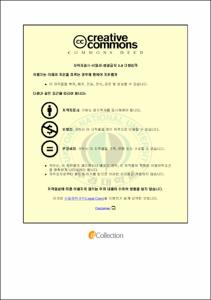유아의 공격성이 유아교육기관 적응에 미치는 영향에 대한 교사-유아 갈등관계의 매개효과
- Abstract
- The Mediating Effects of Teacher-child Conflictual Relationship on the Relationship between Aggressive Tendency of Preschool Children and their Preschool Adjustment
Jeong Mal Suk
Early Childhood Education Major
Graduate School of Education
Pukyong National University
Abstract
This study examined whether teacher-child conflictual relationship has a mediation effect in preschool children's aggression affecting their adjustment to early childhood education institutions according to subfactors of adjustment.
The present study was conducted with a total of 262 young children between the ages of three and five, including 130 male children and 132 female children, and their homeroom teachers. In order to measure preschool children's relational and overt aggressions, the present study used the teacher rating questionnaire Kwon Yeonhee(2011) had developed based on her translation of selective questions from Preschol Socail Behavior Scale-Teacher Form(PSBS) by Mosher(1997). The questionnaire was composed of six questions respectively for relational aggression and overt aggression. For the evaluation of preschool children's adjustment to education institute, the present study used the tool Park Insuk(2011) modified and adopted from the translated version of Preschool Adjustment Questionnaire developed by Jewsuwan, Luster and Kostelnik(1993), which was presented in Kim Jieun's(2011) study of the relationship between emotional intelligence and preschool adjustment among five-year-old children. Teacher-child relationship was measured using a set of questions composed of 12 items for conflict, which is a translated adaptation by Kwon Yeonhee(2011) of Student-Teacher Relationship Scale(STRS) developed by Pianta and Steinberg(1992).
The data collected from this study were analyzed in the following manner. To find out the general characteristics of and relationship among variables, the study analyzed mean values and standard deviations using SPSS 21.0 and conducted a t-test. Pearson product-moment correlation analysis was conducted to investigate the association among children's aggression, teacher-child conflictual relationship, and children's adjustment to their educational institutions. A multiple regression analysis was carried out in order to verify the mediation effect of teacher-child conflictual relationship in young children's aggression affecting their adjustment to educational institutions. Verification of mediation effect was carried out through regression analysis in three steps as recommended by Baron and Kenny (1986). Then, the Sobel test was conducted to assess whether the mediation effect is significant.
The results of the study were as follows. First, the relationship between preschool children's aggression, teacher-child conflictual relationship, and adjustment to educational institutions was examined. Children's aggression showed significant correlation with teacher-child conflictual relationship and children's adjustment to educational institutions.
Preschool children's aggression had a negative correlation with subfactors of adjustment to educational institutions, including prosocial behaviors, positive emotion, peer competence, and adjusting to life at early childhood educational institutions, and with the exception of ego strength. Also, teacher-child conflictual relationship indicated negative correlation with subfactors including prosocial behaviors, positive emotions, peer competence, and adjusting to life at early childhood educational institutions.
Second, examining the mediation effect of teacher-child conflictual relationship in the relationship between children's aggression and their adjustment to educational institutions, it was found that teacher-child conflictual relationship holds a perfect mediation in all subfactors of children's adjustment to educational institutions. The detail findings by each subfactors of children's adjustment to educational institutions are as follows.
Study results indicated that teacher-child conflictual relationship holds a perfect mediation effect in the relationship between children's aggression and children's positive emotions and peer competence. In terms of children's aggression having an effect on prosocial behaviors, ego strength and adjusting to life at early childhood educational institutions, it was found that teacher-child conflictual relationship holds partial mediation effect.
Keywords: relational aggression, overt aggression, teacher-child conflictual relationship, preschool adjustment, subfactors of adjustment , mediation effect.
- Issued Date
- 2014
- Awarded Date
- 2014. 2
- Type
- Dissertation
- Publisher
- 부경대학교
- Affiliation
- 대학원
- Department
- 대학원 유아교육학과
- Advisor
- 이희영
- Table Of Contents
- 목 차
ⅵ
Ⅰ. 서론 1
1. 연구의 필요성 및 목적 1
2. 연구문제 6
3. 용어의 정의 6
Ⅱ. 이론적 배경 9
1. 유아기 공격성 9
가. 유아기 공격성의 개념 9
나. 공격성의 유형 10
2. 유아교육기관 적응 11
가. 유아교육기관 적응의 개념 11
나. 유아교육기관 적응의 하위요소 12
3. 교사-유아관계 19
4. 유아의 공격성, 교사-유아 관계, 유아교육기관 적응의 관련성에 관한 선행연구 22
Ⅲ. 연구방법 26
1. 연구대상 26
2. 측정도구 27
가. 유아의 공격성 27
나. 유아교육기관 적응 28
다. 교사-유아 관계 29
3. 연구절차 30
가. 예비조사 30
나. 본조사 31
4. 자료분석 31
Ⅳ. 연구결과 33
1. 변인의 평균과 표준편차 및 차이 검증 33
2. 유아의 공격성, 교사-유아 갈등관계, 유아교육기관 적응의 상관 관계 34
3. 유아의 공격성, 유아교육기관 적응의 관계에서 교사-유아 갈등관계의 매개 효과 36
Ⅴ. 논의 및 결론 45
1. 논의 45
2. 결론 및 제언 52
54
60
- Degree
- Master
- Files in This Item:
-
-
Download
 유아의 공격성이 유아교육기관 적응에 미치는 영향에 대한 교사-유아 갈등관계의 매개효과.pdf
기타 데이터 / 732.52 kB / Adobe PDF
유아의 공격성이 유아교육기관 적응에 미치는 영향에 대한 교사-유아 갈등관계의 매개효과.pdf
기타 데이터 / 732.52 kB / Adobe PDF
-
Items in Repository are protected by copyright, with all rights reserved, unless otherwise indicated.